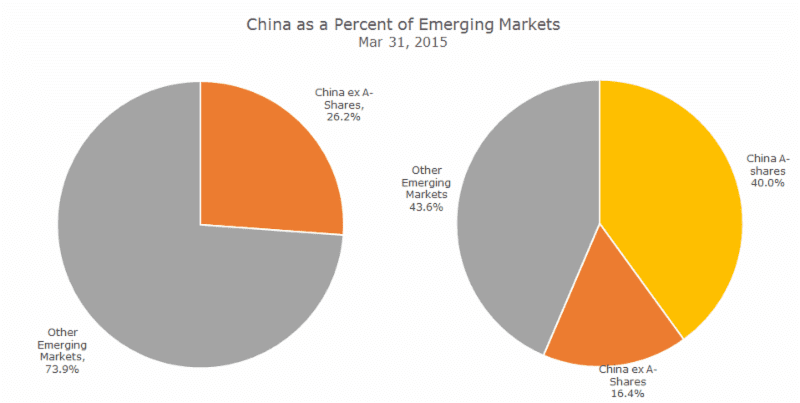When the Communist People’s Republic of China (PRC) took control of China in 1949, all privately owned assets were expropriated by the government and what were once vibrant capital markets went dark until December, 1990 when eight companies started to trade publicly on the Shanghai Stock Exchange.
Now, as I wrote in April, the mainland Chinese stock markets are red hot and many people believe they are in the middle of a bubble. I wasn’t too worried, though, because foreign investors generally don’t have access to mainland China markets, so if the bubble did burst, it would mostly impact Chinese investors.
Yesterday, I received a communication from Vanguard that changes the calculus of my original conclusions because they are now going to add mainland Chinese stocks, so called A-shares, to their indexes.
The impact will be dramatic because the A-Shares market is so large. Initially, A-share stocks were only available to the Chinese, and foreigners were prohibited.
Over time, the Chinese government has increased the quota for outsider ownership and now Vanguard believes the quota is large enough that they can own the A-shares in their index funds (or, Vanguard was specifically awarded a quota, I wasn’t sure from the information that they provided).
The pie charts show the enormous impact of including the A-Shares, based on data from the index provider FTSE-Russell.
Today, when you only include the stocks available to outsiders (B-shares, H-shares, P-Chips and Red Chips), China represents about a little more than 25 percent of all emerging markets stocks. When the A-shares are included, the total China representation jumps to 56.4 percent of all emerging markets.
What the pie charts don’t show is the total jump in value – you can see that the share has grown, but you can’t see that the whole pie is bigger. The market capitalization of exA-shares today is about $2 trillion and the A-shares is roughly $6 trillion, so our exposure to all of China is quadrupling from $2 to $8 trillion.
Amazingly, that puts China at the second largest stock market in the world. The US still dominates with a market value of $26.3 trillion as of December 2014, but the second largest, Japan at $4.4 trillion now drops to a distant third place.
Just 10 years ago, the value of all Chinese stocks was just $667 billion. For context, US stocks were worth $16.2 trillion and Japanese stocks were worth $5.8 trillion.
One of the good things about Vanguard’s announcement is that they won’t be fully adopting the A-shares overnight. Vanguard, the epitome of responsible and prudent investing, will slowly adopt the A-shares into their emerging markets fund.
Right now, the fund is 29 percent China and that will increase six percent to 35 percent. It isn’t clear at this point what changes and additions will be made to the China allocation after this one, which will occur by the end of the year.
The addition of the A-shares isn’t all of the news either. Vanguard is adding small cap emerging market stocks to their fund, making it a ‘total market’ fund that includes large, mid and small cap exposure in one fund.
Vanguard is doing the same thing in their developed market index funds, which we also use, and they are adding Canada, which has been inexplicably missing from foreign indexes for decades.
The changes to the developed index may alter our overall strategy for the asset class because we already have a small cap and value tilt. And we might want to dial that back some depending on how things shake out.
At this point, I’m still not worried about the addition of the A-shares to our emerging markets exposure because it’s still very small. We have a five percent weight to emerging markets within stocks (which are often only 50 to 60 percent of a portfolio), so the increase in China exposure is very small from our perspective.
I’m very happy about all of the changes that Vanguard is making because it increases diversification and expected returns. They aren’t just getting cheaper, they’re getting better!



